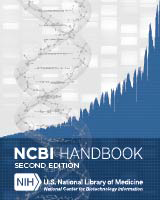

Please refer to our guides for specific information about:
The National Center for Biotechnology Information (NCBI) advances science and health by providing access to biomedical and genomic information.
The power of NCBI's resources is found in their relationship to one another, as most are linked together (check out this example from the Structure Group), providing a comprehensive toolkit for researchers in biomedicine. View the full list of tools and resources:
To programmatically search and download records from NCBI databases, use the Entrez Programming Utilities (E-utilities).
Online tutorials and help are available at each site, and a nice collection of tutorials can be found on NCBI's Section of the National Library of Medicine (NLM) YouTube channel.
Other help and tutorials can be found on the NCBI Tutorials website.


An annual update on database resources is published in Nucleic Acids Research:

The weekly update of technical news from the National Library of Medicine. You'll find previews of coming changes to databases, tips on tools, and more.
There are several ways to search and retrieve data from GenBank.